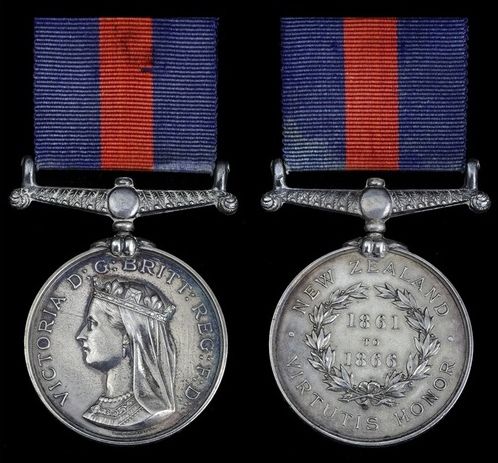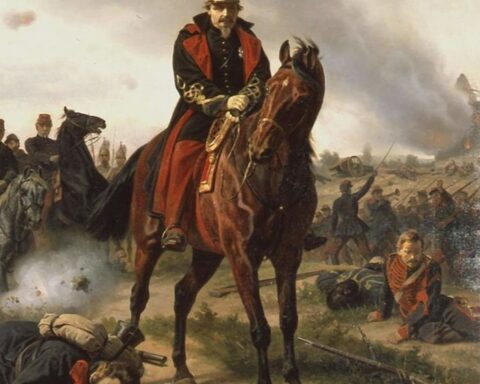Editor’s note: The following is extracted from Military History: Lectures Delivered at Trinity College, Cambridge, by the Hon. J. W. Fortescue (published 1914).
There is another description of colonial war of which we have had experience, and which from the extreme peculiarity of the country and people deserves special notice. I speak of New Zealand. Roughly speaking the two main islands of New Zealand exactly correspond to Italy in our own hemisphere; and if you suppose the sea to close round the northern frontier of the Alps and to cut the peninsula in two by washing a channel through it somewhere about Rome, you will find the actual shape of New Zealand very closely reproduced. Both countries consist of a backbone of volcanic mountains, with a broad margin to east and a narrow margin to west; and in each there is a wide fertile plain made up of debris washed down from the mountains and furrowed by rivers flowing from the glaciers. This great plain, however, is in the south island of New Zealand; and all of our wars were in the north island, corresponding in the southern hemisphere to the southern portion of Italy. The north island, which contains several active volcanoes, is for the most part mountainous and was to a vast extent covered with dense forest, with a strong undergrowth of vines — known as supple-jacks — and of fern, very like our own bracken, which grows higher than a man’s head. The inhabitants were themselves invaders from the North Pacific, or possibly from some part of the American continent, and, according to their own traditions, must have occupied the country at about the time of our own Norman Conquest. They were called, as of course you know, by the name of Maoris, and were split up into a number of tribes which passed their time in continual warfare with each other, and hence possessed some degree of military organisation. Their weapons and tools were made of stone, the best of them of jade. With such tools they had skill to build canoes and art to ornament both prow and paddle with not unbeautiful carving. They were cannibals, for the simple reason that they could get no other meat; for until the white man came there were no four-footed creatures in the two islands — nothing but birds. They caught and dried fish, however, and had little provision-grounds of potatoes. But their chief business, as I have said, was fighting; and they were a fine athletic and high-spirited race. For the rest they had a natural gift of fortification. They needed no great talent to select good positions in so hilly a country where natural strongholds abound; but they showed great skill in throwing up tiers of earth-works and erecting stockades of trees a foot in diameter, tightly bound together with supple-jacks.
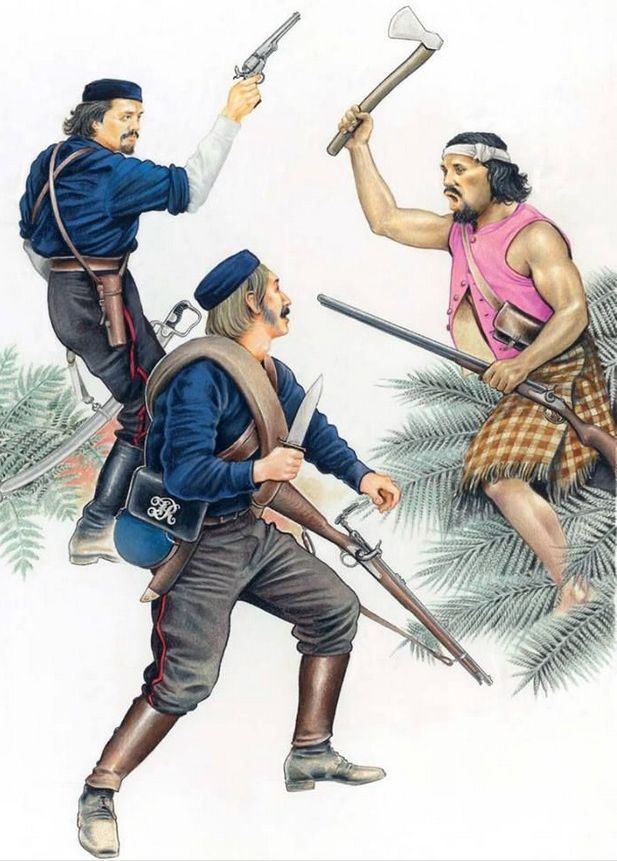
The first white men came to them in the form of whaling skippers, who initiated them into the use of fire-arms, and sold such weapons as they could spare to one or two chiefs. The remaining tribes soon discovered that, if they were to escape extermination, they must obtain fire-arms also; and thus there grew up a large trade in arms and ammunition for which the Maoris paid in native flax — phormium tenax — laboriously scraped with shells till only the tough fibre was left, and of supreme excellence from this careful method of curing. Two-barrelled fowling pieces — tuparas as they called them — were the favourite weapon, and the Maoris soon became expert in their use; adding thereupon rifle-pits and covered trenches to their fortifications to meet attack with the new weapon. Incidentally this natural craze for fire-arms materially injured the race, for, in order to scrape flax enough to pay for them, the whole tribe was obliged to come down from the hill-tops and live by the swamps where the phormium tenax grows and abounds.
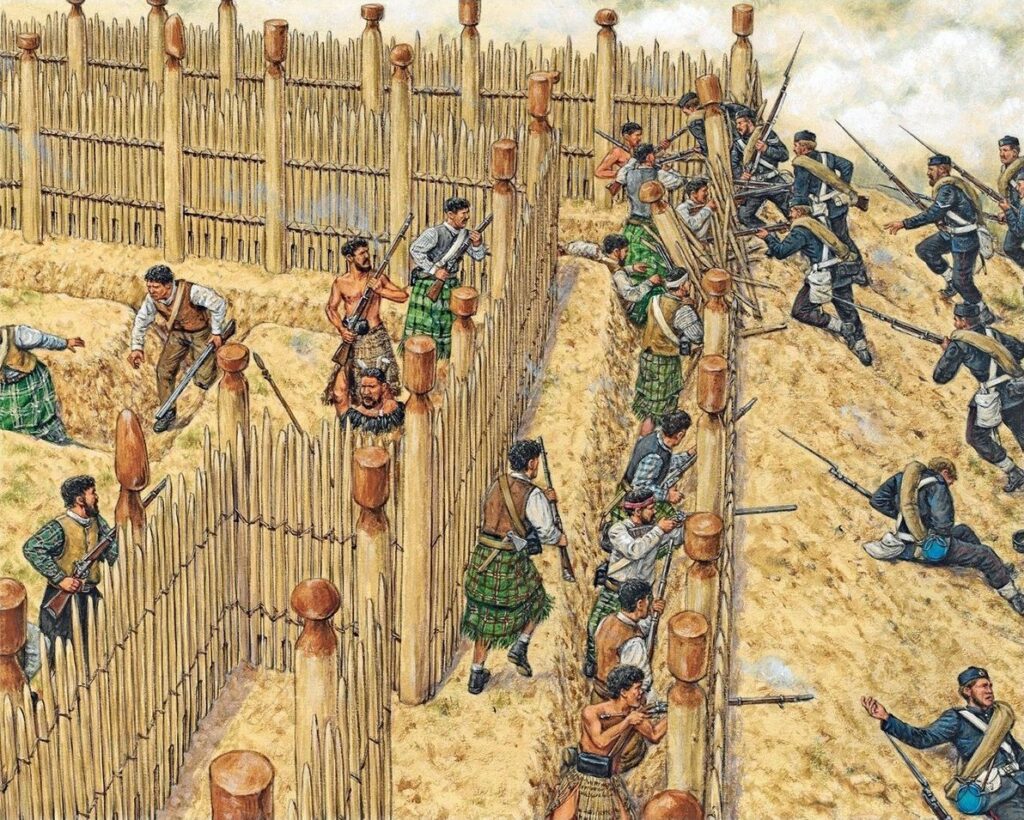
How we came into collision with the Maoris, who had frequently received white men — deserting sailors and such like — into their tribes with much friendliness, is not a pretty story; being only one of the many variations on the old theme of the white man’s greed for the black man’s property. Of course it was necessary to send troops out; and our commanders, hearing of the fortifications or pas erected by the Maoris, thought that such works could not have been thrown up except to defend something, and that it would be desirable to capture them. They therefore brought up a gun or two with infinite labour, and after firing a certain number of rounds, let loose their assaulting columns to the attack. Now as a matter of fact the Maoris built their pas upon no such principle; and the loss of a pa was nothing to them so long as no life was lost with it. They therefore continued to build pas in the hope that the white men would ram their heads against them; and they did so with considerable cunning, erecting their first pa close to the edge of the forest, retiring from that to a second further within the woods, so as to lure the English deeper and deeper into disadvantageous ground, and from that in turn to a third. By the time the third was reached the English were unable to bring their food any further, and, having lost heavily in their assaults, were fain to retire and await reinforcements.
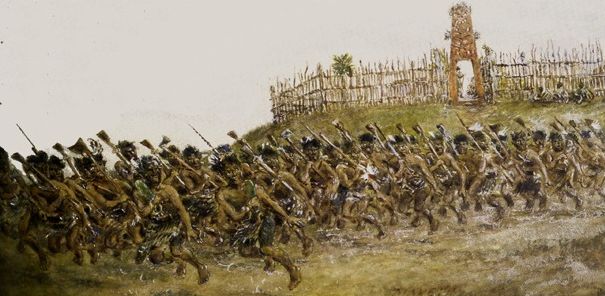
The chief difficulty, as in all savage campaigns, lay of course in transport and supply. There were no roads or bridges, and few animals, whether horses, mules or cattle; but as all the settlements were on the sea, the Maoris had built their pas in the vicinity, so as to be ready to attack the whites at any moment. Still, even when the difficulty of transport and supply was overcome, our commanders were greatly puzzled how to injure the Maoris. So powerfully were the tree-trunks of a stockade laced together, that even when broken by a shot they did not fall, but remained suspended, a nasty if not impossible obstacle, by the binders of supple-jack. Thus assaults were always costly, and somehow the Maori garrison always contrived to escape. Again and again a pa was surrounded, but there was always a ravine or a watercourse by which the Maoris slipped away; and when the British column, maddened by heavy losses, broke into the earth-works, it was to find no one there. Once two British columns stormed a pa, enduring heavy fire until they reached the summit, when the Maoris dived down into their subterranean galleries. The British soldiers, rushing in from opposite sides, met at the top, and poured a staggering volley into each other, whereupon up came the Maoris from underground, and sent the assailants flying down again in panic. Altogether the problem of the pa seemed to be insoluble, for the galleries and rifle-pits of the Maoris were so cunningly constructed that a bombardment inflicted only trifling damage on them. Critics at a distance wrote that every success (for such the capture of a pa was deemed to be) should be followed by a rapid advance into the forest. But deep ravines and gullies covered either with a network of supple-jacks, or with fallen logs and trees hidden in bracken six or seven feet high, is not ground over which men can advance rapidly. I know it because I have tried it; and the unhappy soldiers, who had also tried it, waxed furious over the ignorant presumption of those who talked such nonsense.
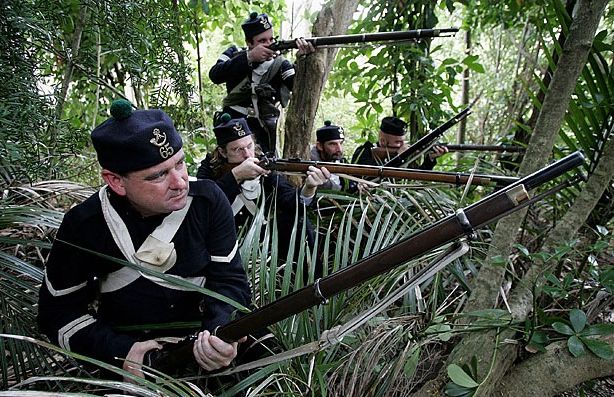
At last it occurred to a British officer that the Maoris wished their pas to be assaulted, and that they considered it a victory when several scores of British fell in an attack upon a worthless stronghold, while the defenders quietly retired with at most two or three casualties. And this was the fact. Having grasped this truth the officer determined not to attack them; but marched up to the vicinity of a pa, sat down in front of it, and entrenched himself and his guns before it. This did not suit the Maoris at all. They saw that they would be obliged to go back sooner or later, without the satisfaction of killing fifty or sixty of the enemy, and they did not see where the process might end. In desperation they attempted several attacks against the English earth-works, but were repulsed with heavy loss, and were fain to draw back to another pa further within the forest. The British followed, and went through the same performance again, with the same result. In a few weeks these particular Maoris gave in, for they saw no prospect of emerging from the forest again; and though they might have kept themselves alive on fern-root, they knew that their warriors would soon lose all physical strength upon such a diet. The Maori wars lasted in one way or another for nearly twenty years in a desultory fashion, partly owing to mismanagement, partly, I fear, because so many contractors in the colonial towns made money out of them that people were unwilling to let them come to an end. When the Imperial troops and money were withdrawn, and the colonists were left to finish the job for themselves, the trouble with the Maoris soon ceased.
